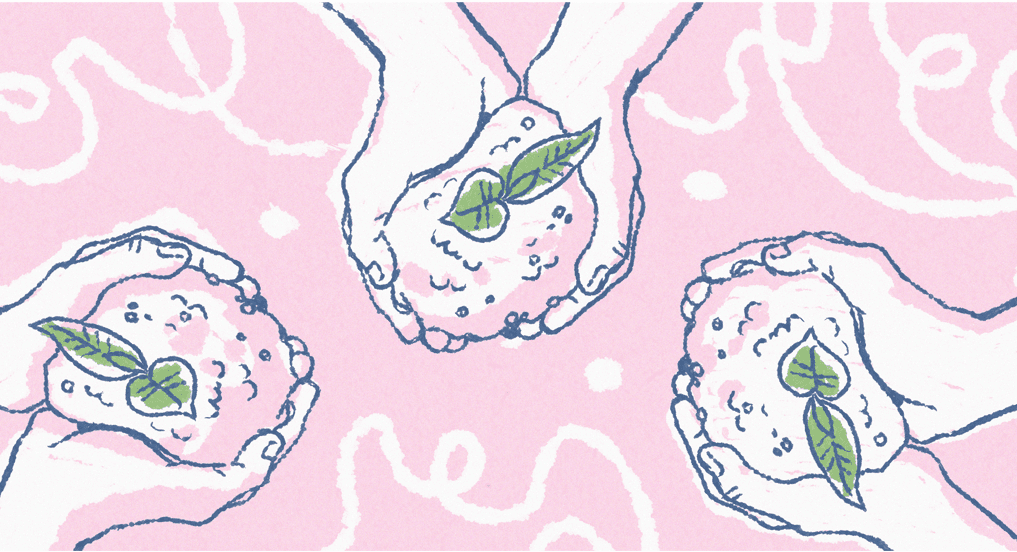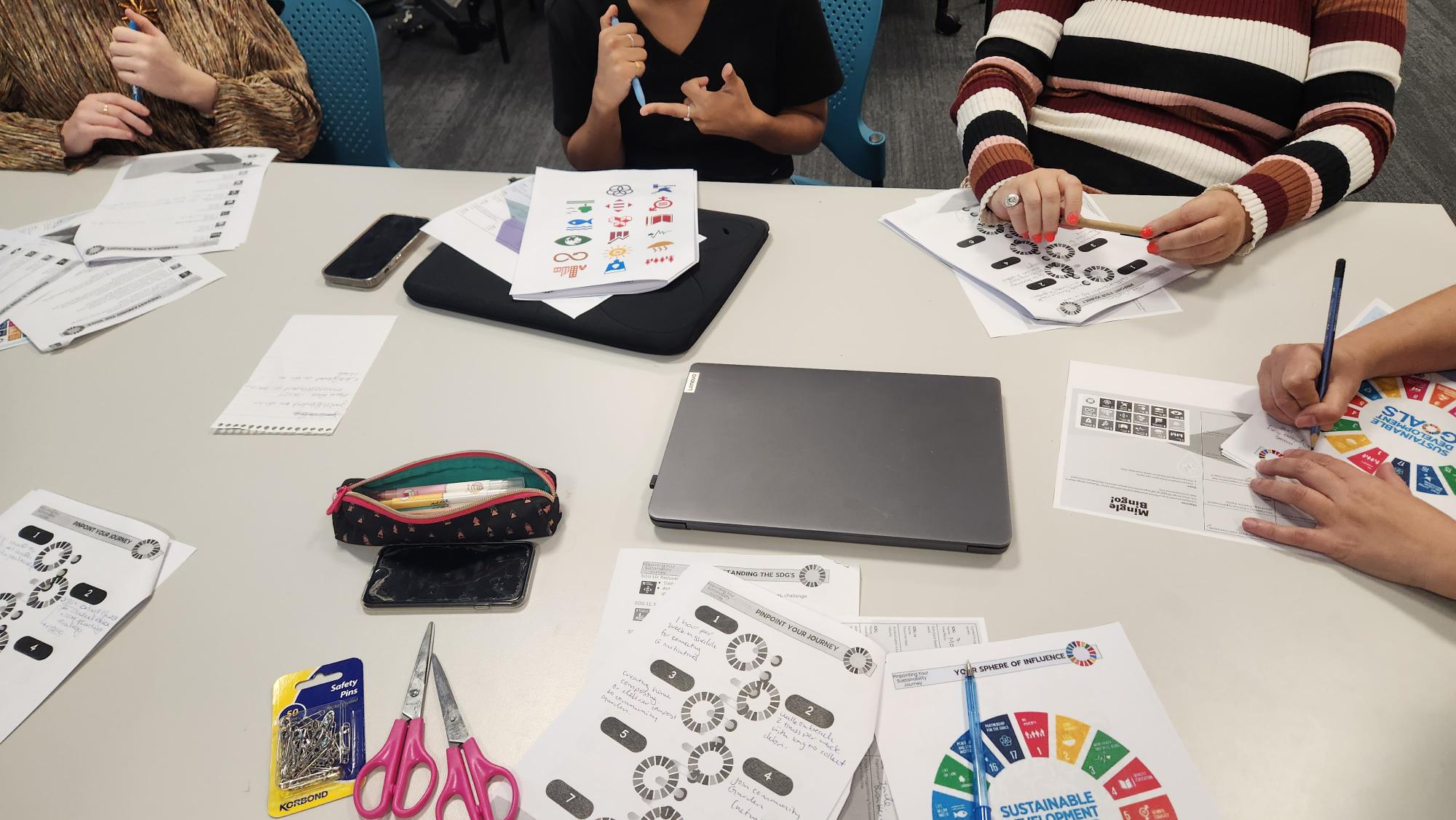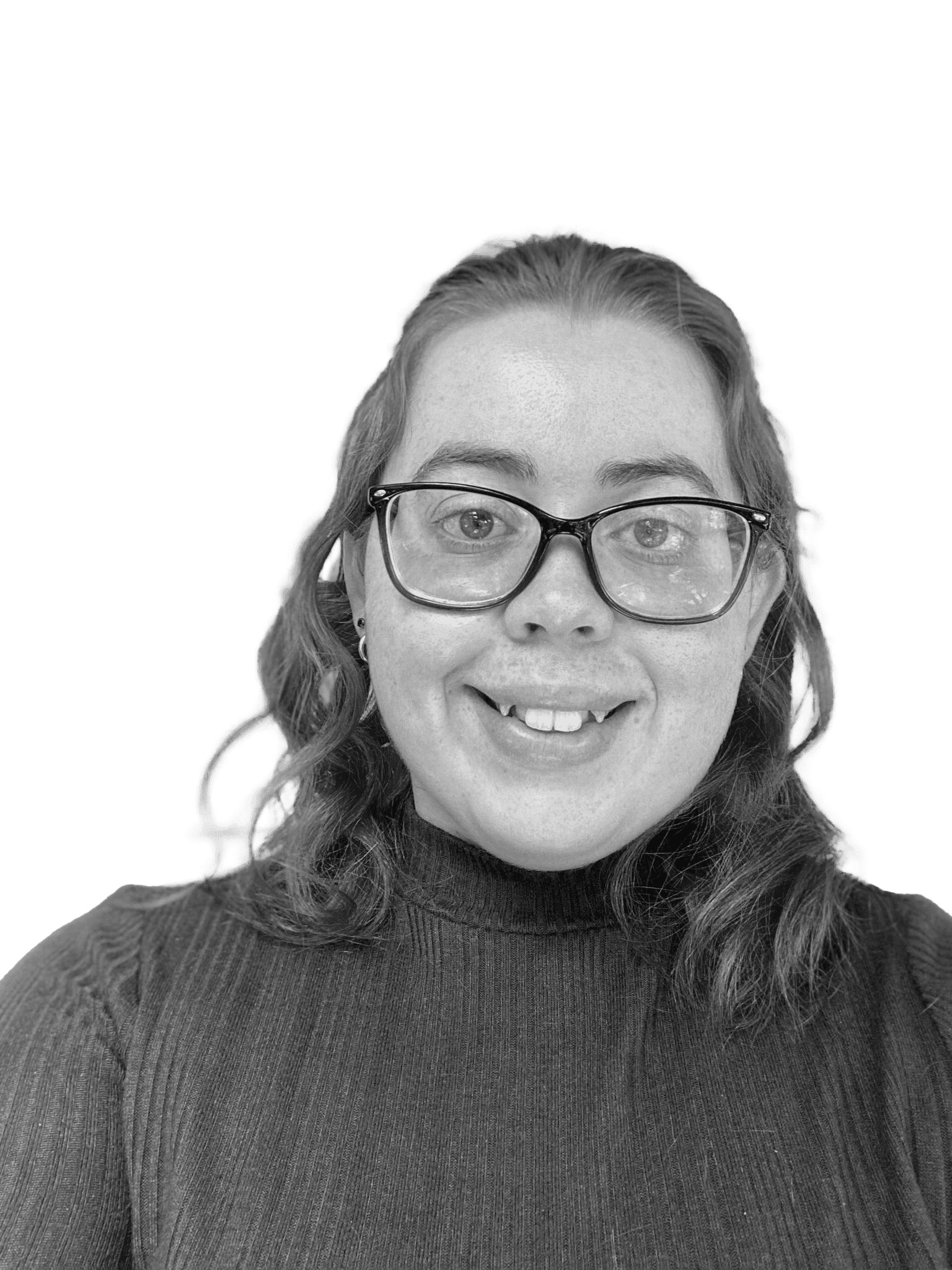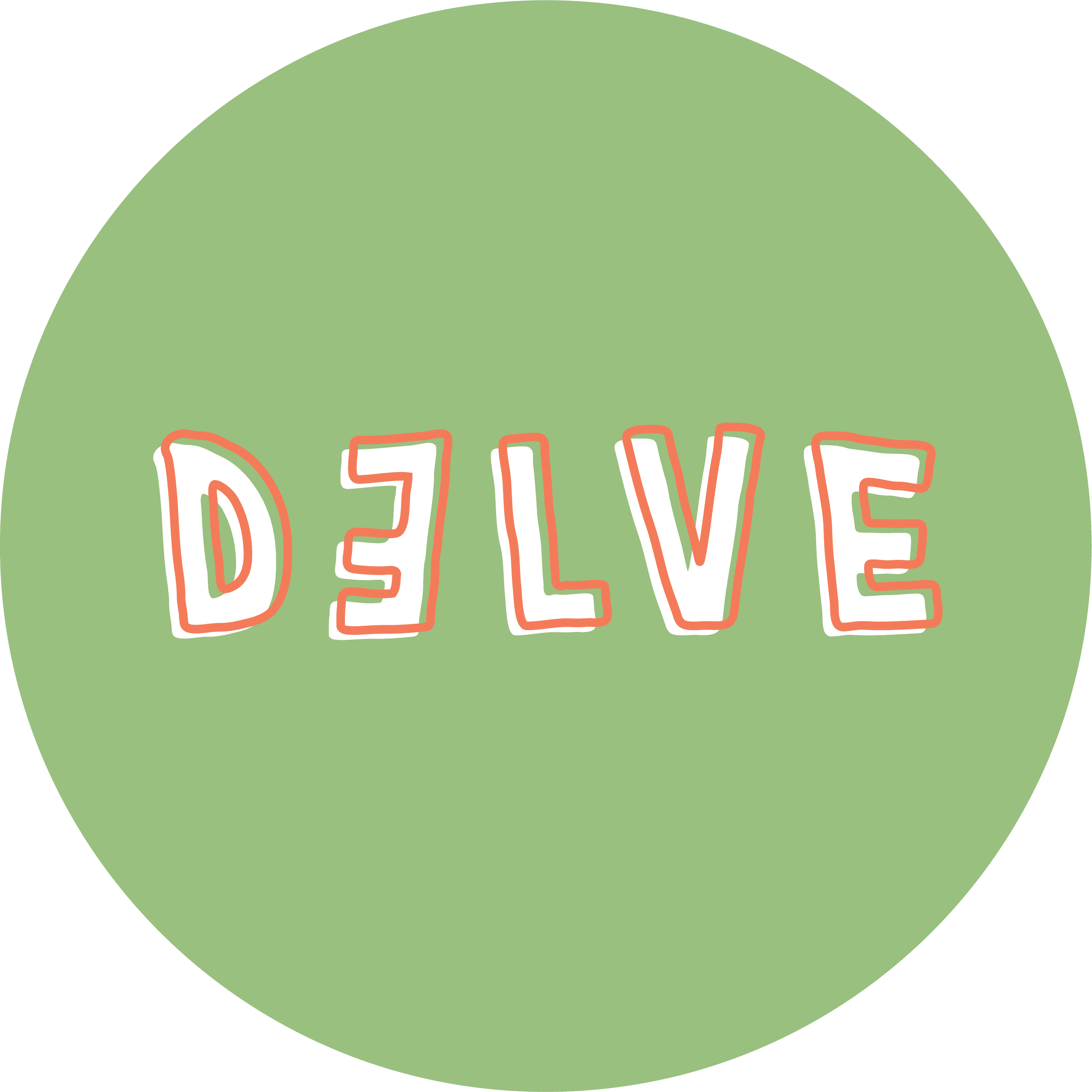
Taking meaningful steps towards sustainability
Taking meaningful steps towards sustainability
In a world increasingly concerned with the environment, the call for sustainable living practices resonates with growing urgency. For many, the desire to lead a greener and more sustainable lifestyle is palpable, but where to begin is not always clear. Actionable guidance and motivation are essential for individuals to begin their journey towards a sustainable lifestyle.
In a world increasingly concerned with the environment, the call for sustainable living practices resonates with growing urgency. For many, the desire to lead a greener and more sustainable lifestyle is palpable, but where to begin is not always clear. Actionable guidance and motivation are essential for individuals to begin their journey towards a sustainable lifestyle.
During UniSC’s 2023 Sustainability Week a workshop, titled “Pinpointing Your Sustainability Journey”, was created by Green Ambassadors Carmine Buss and Fien Van den Steen. The workshop is an evolving initiative with a primary focus on the 2030 UN Sustainable Development Goals (SDGs), designed as a dynamic space for collaboration and visual language to converge and pave the way for individuals to take concrete steps towards a sustainable lifestyle.

Carmine and Fien emphasized the importance of avoiding rigid, predefined workshop structures, instead wishing only to focus on maintaining a consistent theme related to theSDGs. “Some of them will be very focused on a certain SDG and some will show how some might be interconnected,” confirms Carmine.
The pilot session began with an introduction to the SDGs and how they relate to participants' personal lives as a way to emphasize how these global goals can translate into concrete, daily actions that can be taken by individuals. Attendees were encouraged to identify their specific SDG interests that aligned with their intrinsic motivations and existing efforts. By enhancing the activities they are already passionate about, participants can contribute meaningfully to the SDGs. “If we're already going to be motivated to do, say, composting or reducing plastic waste, we can find additional steps within those passions to kind of work with our own motivations,” says Carmine.
The second part of the session explored the idea of collective action, highlighting the importance of working together and overcoming the limitations of individual actions by leveraging attendees’ spheres of influence. Participants were encouraged to share their initiatives, model positive behaviours and create social norms for sustainable practices through their spheres of influence, thereby fostering a ripple effect that extends beyond the individual. Carmine and Fien’s workshop places unwavering emphasis on the role of collaboration and community in driving sustainability. As Fien puts it,
"Without partnerships, without collaboration, there can't be sustainability because we can't know everything. We can't do everything. But all together we have all the bits and pieces that we can put together to actually make transformational change”.
Indeed, SDG17 – Partnerships for the Goals – underscores the promise of sustainability through collective efforts. The journey towards a sustainable future is not one of solitude but rather a community-driven endeavour.
Fien goes on to explain that sustainability is more than environmental actions, it’s about rekindling connections – with the planet, each other and with ourselves. It’s a shift from the divisive “divide and conquer” paradigm to one rooted in collaboration. This transformational perspective underscores why collaboration is at the core of the workshop’s mission.
Strikingly, Carmine and Fien are not content to settle with leaving their workshop’s influence to just the university, aiming to extend their reach beyond its walls. As Carmine highlights: “It’s not just for our students and staff, it’s for our community as well.”
They recognise that the community is teeming with individuals passionate about sustainability, each in their unique “little pockets". The workshop serves as a bridge, connecting these pockets and weaving a network of change.
It is not about waiting for large institutions to enact transformation — it’s about individuals, communities and networks igniting change collaboratively. This grassroots spirit holds the potential to make a profound impact, fostering a shared commitment to sustainable living that extends beyond the workshop itself.
“We are actually in contact with the Sunshine Coast Council here, and she’s [Carmine] part of the biosphere. We will try to use and work together with her to expand our network beyond the university and really address and target the entire community,” Fien reveals.
This strategic collaboration extends the reach of their initiatives. The Sunshine Coast Biosphere, a community council-run program, is a crucial partner in their efforts. “There are 176 biospheres in Australia and 7,700 worldwide. We’re lucky to tap into such a network. The advisors for that biosphere come from various areas ... By utilising our resources to the fullest, we can tap into these different areas through the biosphere,” Carmine elaborates.
The emphasis here is on strategy and finding the right passionate, values-driven individuals. It’s about creating points of collaboration with those who share their mission. The dynamic reach of the biosphere network and the diverse expertise of its advisors offer a rich platform for driving sustainability across multiple sectors. It is not just about what happens within the university but how the university becomes a catalyst for change in the broader community, fuelled by shared values and collaboration.
"The journey towards a sustainable future is not one of solitude but rather a community-driven endeavour."

16.10.23
written by
ellie cooper


During UniSC’s 2023 Sustainability Week a workshop, titled “Pinpointing Your Sustainability Journey”, was created by Green Ambassadors Carmine Buss and Fien Van den Steen. The workshop is an evolving initiative with a primary focus on the 2030 UN Sustainable Development Goals (SDGs), designed as a dynamic space for collaboration and visual language to converge and pave the way for individuals to take concrete steps towards a sustainable lifestyle.
Carmine and Fien emphasized the importance of avoiding rigid, predefined workshop structures, instead wishing only to focus on maintaining a consistent theme related to theSDGs. “Some of them will be very focused on a certain SDG and some will show how some might be interconnected,” confirms Carmine.
The pilot session began with an introduction to the SDGs and how they relate to participants' personal lives as a way to emphasize how these global goals can translate into concrete, daily actions that can be taken by individuals. Attendees were encouraged to identify their specific SDG interests that aligned with their intrinsic motivations and existing efforts. By enhancing the activities they are already passionate about, participants can contribute meaningfully to the SDGs. “If we're already going to be motivated to do, say, composting or reducing plastic waste, we can find additional steps within those passions to kind of work with our own motivations,” says Carmine.
The second part of the session explored the idea of collective action, highlighting the importance of working together and overcoming the limitations of individual actions by leveraging attendees’ spheres of influence. Participants were encouraged to share their initiatives, model positive behaviours and create social norms for sustainable practices through their spheres of influence, thereby fostering a ripple effect that extends beyond the individual. Carmine and Fien’s workshop places unwavering emphasis on the role of collaboration and community in driving sustainability. As Fien puts it,
Carmine and Fien emphasized the importance of avoiding rigid, predefined workshop structures, instead wishing only to focus on maintaining a consistent theme related to theSDGs. “Some of them will be very focused on a certain SDG and some will show how some might be interconnected,” confirms Carmine.
The pilot session began with an introduction to the SDGs and how they relate to participants' personal lives as a way to emphasize how these global goals can translate into concrete, daily actions that can be taken by individuals. Attendees were encouraged to identify their specific SDG interests that aligned with their intrinsic motivations and existing efforts. By enhancing the activities they are already passionate about, participants can contribute meaningfully to the SDGs. “If we're already going to be motivated to do, say, composting or reducing plastic waste, we can find additional steps within those passions to kind of work with our own motivations,” says Carmine.
The second part of the session explored the idea of collective action, highlighting the importance of working together and overcoming the limitations of individual actions by leveraging attendees’ spheres of influence. Participants were encouraged to share their initiatives, model positive behaviours and create social norms for sustainable practices through their spheres of influence, thereby fostering a ripple effect that extends beyond the individual. Carmine and Fien’s workshop places unwavering emphasis on the role of collaboration and community in driving sustainability. As Fien puts it,
"Without partnerships, without collaboration, there can't be sustainability because we can't know everything. We can't do everything. But all together we have all the bits and pieces that we can put together to actually make transformational change”.
Indeed, SDG17 – Partnerships for the Goals – underscores the promise of sustainability through collective efforts. The journey towards a sustainable future is not one of solitude but rather a community-driven endeavour.
Fien goes on to explain that sustainability is more than environmental actions, it’s about rekindling connections – with the planet, each other and with ourselves. It’s a shift from the divisive “divide and conquer” paradigm to one rooted in collaboration. This transformational perspective underscores why collaboration is at the core of the workshop’s mission.
Strikingly, Carmine and Fien are not content to settle with leaving their workshop’s influence to just the university, aiming to extend their reach beyond its walls. As Carmine highlights: “It’s not just for our students and staff, it’s for our community as well.”
They recognise that the community is teeming with individuals passionate about sustainability, each in their unique “little pockets". The workshop serves as a bridge, connecting these pockets and weaving a network of change.
It is not about waiting for large institutions to enact transformation — it’s about individuals, communities and networks igniting change collaboratively. This grassroots spirit holds the potential to make a profound impact, fostering a shared commitment to sustainable living that extends beyond the workshop itself.
“We are actually in contact with the Sunshine Coast Council here, and she’s [Carmine] part of the biosphere. We will try to use and work together with her to expand our network beyond the university and really address and target the entire community,” Fien reveals.
This strategic collaboration extends the reach of their initiatives. The Sunshine Coast Biosphere, a community council-run program, is a crucial partner in their efforts. “There are 176 biospheres in Australia and 7,700 worldwide. We’re lucky to tap into such a network. The advisors for that biosphere come from various areas ... By utilising our resources to the fullest, we can tap into these different areas through the biosphere,” Carmine elaborates.
The emphasis here is on strategy and finding the right passionate, values-driven individuals. It’s about creating points of collaboration with those who share their mission. The dynamic reach of the biosphere network and the diverse expertise of its advisors offer a rich platform for driving sustainability across multiple sectors. It is not just about what happens within the university but how the university becomes a catalyst for change in the broader community, fuelled by shared values and collaboration.
"The journey towards a sustainable future is not one of solitude but rather a community-driven endeavour."
16.10.23
written by
ellie cooper

16.10.23
written by
ellie cooper

